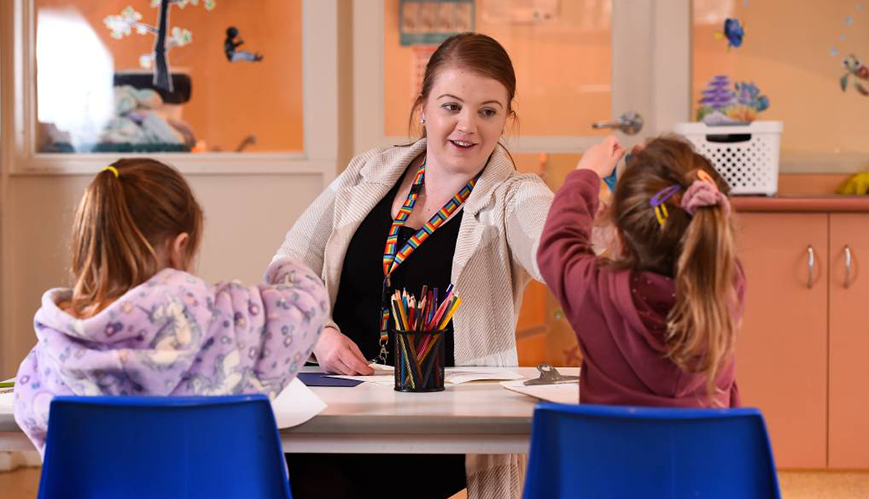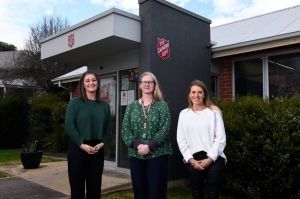Karinya a lifeline for vulnerable parents in Ballarat

Karinya a lifeline for vulnerable parents in Ballarat
29 September 2021
Tiffany Day is one of Karinya’s childcare workers and is trained to support children who have experienced family violence, trauma and homelessness. Picture by Adam Trafford, courtesy of The Courier.
Childcare is often a necessity, but it remains an unaffordable luxury for many families. Such is the case for many parents who are experiencing homelessness in Ballarat, Victoria.
The Salvation Army Karinya Support Services has become a lifeline for a group of families breaking the cycle of generational poverty.
 The tight-knit team at Karinya Support Services in Ballarat work tirelessly to help families break generational poverty. (From left) Manager Kellie Brown, Team Leader Sonia Lefevre and Child and Youth Services Team Leader Louise Jeffrey. Picture by Adam Trafford, courtesy of The Courier.
The tight-knit team at Karinya Support Services in Ballarat work tirelessly to help families break generational poverty. (From left) Manager Kellie Brown, Team Leader Sonia Lefevre and Child and Youth Services Team Leader Louise Jeffrey. Picture by Adam Trafford, courtesy of The Courier.
Karinya is one of only three Salvation Army childcare services in the nation. It provides high-quality care for children who have experienced family violence, trauma, and homelessness, while parents are offered opportunities to attend parenting and life skills programs.
“The centre provides care for six-week-old babies to preschool-aged children, with children of varying ages and siblings in the room together,” explains Louise Jeffrey, Child and Youth Services Team Leader at Karinya. “This is particularly beneficial for those children and families who have experienced trauma or have attachment issues and enables us to work more holistically and more extensively with the families.”
Childcare is offered during school terms four days a week at $16 per session. Staff are trained in childhood trauma, the effects of homelessness on children, and attachment issues. The childcare planning and program development is based on each child’s needs and interests.
“Our staff incorporate life skills into their activities – they have done gardening and basic cooking, and we hope the children will join these tasks at their home with their family,” said Louise.
There is also plenty of time for imaginative play. The children love to get their hands dirty by painting and using play dough. These activities aren’t time fillers – they help the kids develop fine motor skills and express and understand their emotions.
While the children develop friendships, the parents and families do too. Many of them live in Karinya’s supported properties and work closely with case workers daily. Monthly client catch-ups also create a sense of community for the parents, which is vital as they move forward.
“The hope is that the clients will form friendships and provide support and guidance to each other,” said Louise. “This sense of community is fundamental as each parent or family works towards long-term goals, including learning independent living skills, finding secure housing and promoting a healthy and happy upbringing for their child.”
At any time, up to 80 women and children live in short- and medium-term crisis accommodation units as part of Programs MEA (Mothers Emergency Accommodation) and Program MaC (Mother and Children). Karinya also supports clients in the Young Families Connected Program and has a children’s worker who provides more targeted and specialised support.
“Karinya regards the support to a child as a high priority, and if the child is old enough to articulate their own needs and goals, we really listen to their voice as part of their case planning,” explains Louise.
Ultimately, the Karinya team know it takes more than housing security to help a family heal. And while so few private rentals are available due to housing demand, they work closely with parents to help provide a stable and loving life for their children.
“That’s why we also focus on [asking], ‘what factors do you think led to you requiring our services? ’ and, ‘what skills do you need to assist with future housing stability?’” said Louise. “We see generational homelessness, so we try to break the cycle [through counselling and programs] and give them the skills to live independently.”
Breaking homelessness is more complicated than just finding housing – it requires a holistic, community-based approach. And the team at Karinya Support Services in Ballarat are committed to providing this, one family at a time.
Comments
No comments yet - be the first.